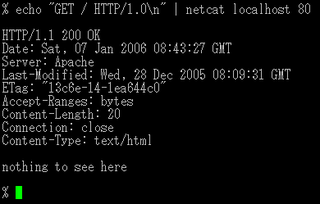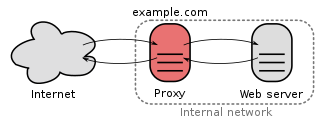See also
- Apache Traffic Server
- Web accelerator which discusses host-based HTTP acceleration
- Proxy server which discusses client-side proxies
- Reverse proxy which discusses origin-side proxies
- Comparison of web server software
- Internet Cache Protocol
| Developer(s) | Apsis GmbH (to 3.0e) [1] Sergei Poznyakoff (4.x) [2] |
|---|---|
| Stable release | 4.5 [3] / February 12, 2023 |
| Written in | C |
| Operating system | Unix |
| Type | open-source |
| License | GPL |
| Website | github |
Pound is a lightweight open source reverse proxy program and application firewall suitable to be used as a web server load balancing solution. Originally developed by an IT security company, it has a strong emphasis on security. The original intent on developing Pound was to allow distributing the load among several Zope servers running on top of ZEO (Zope Extensible Object). However, Pound is not limited to Zope-based installations. Using regular expression matching on the requested URLs, Pound can pass different kinds of requests to different backend server groups. A few more of its most important features:
Pound is distributed under the terms of the GNU General Public License and can be used free of charge even in business environments.

The Apache HTTP Server is a free and open-source cross-platform web server software, released under the terms of Apache License 2.0. Apache is developed and maintained by an open community of developers under the auspices of the Apache Software Foundation.

In computing, load balancing is the process of distributing a set of tasks over a set of resources, with the aim of making their overall processing more efficient. Load balancing can optimize the response time and avoid unevenly overloading some compute nodes while other compute nodes are left idle.

In computer networking, a proxy server is a server application that acts as an intermediary between a client requesting a resource and the server providing that resource.

Squid is a caching and forwarding HTTP web proxy. It has a wide variety of uses, including speeding up a web server by caching repeated requests, caching web, DNS and other computer network lookups for a group of people sharing network resources, and aiding security by filtering traffic. Although primarily used for HTTP and FTP, Squid includes limited support for several other protocols including Internet Gopher, SSL, TLS and HTTPS. Squid does not support the SOCKS protocol, unlike Privoxy, with which Squid can be used in order to provide SOCKS support.
SOCKS is an Internet protocol that exchanges network packets between a client and server through a proxy server. SOCKS5 optionally provides authentication so only authorized users may access a server. Practically, a SOCKS server proxies TCP connections to an arbitrary IP address, and provides a means for UDP packets to be forwarded.

OpenLDAP is a free, open-source implementation of the Lightweight Directory Access Protocol (LDAP) developed by the OpenLDAP Project. It is released under its own BSD-style license called the OpenLDAP Public License.
A BNC is a piece of software that is used to relay traffic and connections in computer networks, much like a proxy. Using a BNC allows a user to hide the original source of the user's connection, providing privacy as well as the ability to route traffic through a specific location. A BNC can also be used to hide the true target to which a user connects.

netcat is a computer networking utility for reading from and writing to network connections using TCP or UDP. The command is designed to be a dependable back-end that can be used directly or easily driven by other programs and scripts. At the same time, it is a feature-rich network debugging and investigation tool, since it can produce almost any kind of connection its user could need and has a number of built-in capabilities.

lighttpd is an open-source web server optimized for speed-critical environments while remaining standards-compliant, secure and flexible. It was originally written by Jan Kneschke as a proof-of-concept of the c10k problem – how to handle 10,000 connections in parallel on one server, but has gained worldwide popularity. Its name is a portmanteau of "light" and "httpd".
In computer networks, a tunneling protocol is a communication protocol which allows for the movement of data from one network to another. It involves allowing private network communications to be sent across a public network through a process called encapsulation.

In computer networks, a reverse proxy is an application that sits in front of back-end applications and forwards client requests to those applications. Reverse proxies help increase scalability, performance, resilience and security. The resources returned to the client appear as if they originated from the web server itself.
Perlbal is a Perl-based reverse proxy load balancer and web server. Perlbal is maintained by a group connected to Danga Interactive. The program is in common use by large web sites to distribute the load over a number of servers.
This article presents a comparison of the features, platform support, and packaging of many independent implementations of Domain Name System (DNS) name server software.
A proxy auto-config (PAC) file defines how web browsers and other user agents can automatically choose the appropriate proxy server for fetching a given URL.

The X-Forwarded-For (XFF) HTTP header field is a common method for identifying the originating IP address of a client connecting to a web server through an HTTP proxy or load balancer.
Hiawatha is a web server available for multiple platforms. It has been developed by Hugo Leisink since 2002.
Varnish is an HTTP accelerator designed for content-heavy dynamic web sites as well as APIs. In contrast to other web accelerators, such as Squid, which began life as a client-side cache, or Apache and nginx, which are primarily origin servers, Varnish was designed as an HTTP accelerator. Varnish is focused exclusively on HTTP, unlike other proxy servers that often support FTP, SMTP and other network protocols.
Nginx is a web server that can also be used as a reverse proxy, load balancer, mail proxy and HTTP cache. The software was created by Igor Sysoev and publicly released in 2004. Nginx is free and open-source software, released under the terms of the 2-clause BSD license. A large fraction of web servers use Nginx, often as a load balancer.

Polipo is a lightweight caching and forwarding web proxy server. It has a wide variety of uses, from aiding security by filtering traffic; to caching web, DNS and other computer network lookups for a group of people sharing network resources; to speeding up a web server by caching repeated requests. It can be configured to use on-disk cache and serve cached content when offline and perform various forms of content filtering.
The Caddy web server is an extensible, cross-platform, open-source web server written in Go.
Apsis GmbH, original upstream, had stopped the development and welcomed Sergey Poznyakoff to pick up and further maintain the project, which is now hosted on GitHub.